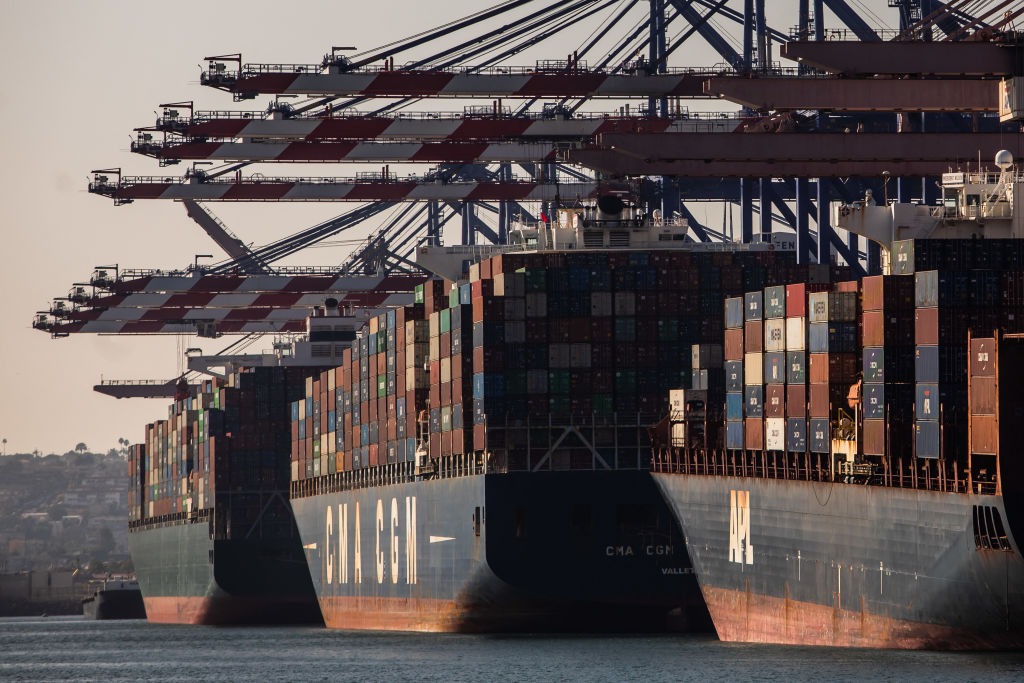Supply chain snarls are reportedly tentatively starting to ease


A free daily email with the biggest news stories of the day – and the best features from TheWeek.com
You are now subscribed
Your newsletter sign-up was successful
The supply chain problems that have flummoxed global trade and fed inflation worldwide "are beginning to recede, but shipping, manufacturing, and retail executives say that they don't expect a return to more-normal operations until next year and that cargo will continue to be delayed if COVID-19 outbreaks disrupt key distribution hubs," The Wall Street Journal reports.
On the favorable side, Asian COVID-related factory shutdowns and port limits have eased, major U.S. retailers have fully stocked shelves for Christmas, and ocean freight costs are down from record highs, the Journal says. But ongoing U.S. trucking and port labor shortages are still a problem, U.S. consumers still are spending frenetically, and extreme heat or more COVID flareups could stress the supply chains again.
"An easing of supply-chain choke points would allow production to move toward meeting strong demand and would lower logistics costs," the Journal reports. "If sustained, that, in turn, would help alleviate the upward pressure on inflation." A mixture of reduced post-Christmas shopping in the U.S. and lower output from Asian factories during the Lunar New Year in February should give U.S. ports some time to catch up.
The Week
Escape your echo chamber. Get the facts behind the news, plus analysis from multiple perspectives.

Sign up for The Week's Free Newsletters
From our morning news briefing to a weekly Good News Newsletter, get the best of The Week delivered directly to your inbox.
From our morning news briefing to a weekly Good News Newsletter, get the best of The Week delivered directly to your inbox.
"Some consumer demand may wane after the holidays, helping the ports begin to catch up," Axios agrees, "but there are three more major trouble spots on the horizon," including labor negotiations at West Coast ports next summer, new International Maritime Organization rules about reducing carbon footprints, and a shortage of shipping containers being returned to Asia. In any case, Axios says, "if goods aren't off a boat by now, it's highly unlikely that they'll make it onto store shelves before Christmas."
A free daily email with the biggest news stories of the day – and the best features from TheWeek.com
Peter has worked as a news and culture writer and editor at The Week since the site's launch in 2008. He covers politics, world affairs, religion and cultural currents. His journalism career began as a copy editor at a financial newswire and has included editorial positions at The New York Times Magazine, Facts on File, and Oregon State University.
-
 The Week Unwrapped: Do the Freemasons have too much sway in the police force?
The Week Unwrapped: Do the Freemasons have too much sway in the police force?Podcast Plus, what does the growing popularity of prediction markets mean for the future? And why are UK film and TV workers struggling?
-
 Properties of the week: pretty thatched cottages
Properties of the week: pretty thatched cottagesThe Week Recommends Featuring homes in West Sussex, Dorset and Suffolk
-
 The week’s best photos
The week’s best photosIn Pictures An explosive meal, a carnival of joy, and more
-
 TikTok secures deal to remain in US
TikTok secures deal to remain in USSpeed Read ByteDance will form a US version of the popular video-sharing platform
-
 Unemployment rate ticks up amid fall job losses
Unemployment rate ticks up amid fall job lossesSpeed Read Data released by the Commerce Department indicates ‘one of the weakest American labor markets in years’
-
 US mints final penny after 232-year run
US mints final penny after 232-year runSpeed Read Production of the one-cent coin has ended
-
 Warner Bros. explores sale amid Paramount bids
Warner Bros. explores sale amid Paramount bidsSpeed Read The media giant, home to HBO and DC Studios, has received interest from multiple buying parties
-
 Gold tops $4K per ounce, signaling financial unease
Gold tops $4K per ounce, signaling financial uneaseSpeed Read Investors are worried about President Donald Trump’s trade war
-
 Electronic Arts to go private in record $55B deal
Electronic Arts to go private in record $55B dealspeed read The video game giant is behind ‘The Sims’ and ‘Madden NFL’
-
 New York court tosses Trump's $500M fraud fine
New York court tosses Trump's $500M fraud fineSpeed Read A divided appeals court threw out a hefty penalty against President Trump for fraudulently inflating his wealth
-
 Trump said to seek government stake in Intel
Trump said to seek government stake in IntelSpeed Read The president and Intel CEO Lip-Bu Tan reportedly discussed the proposal at a recent meeting
